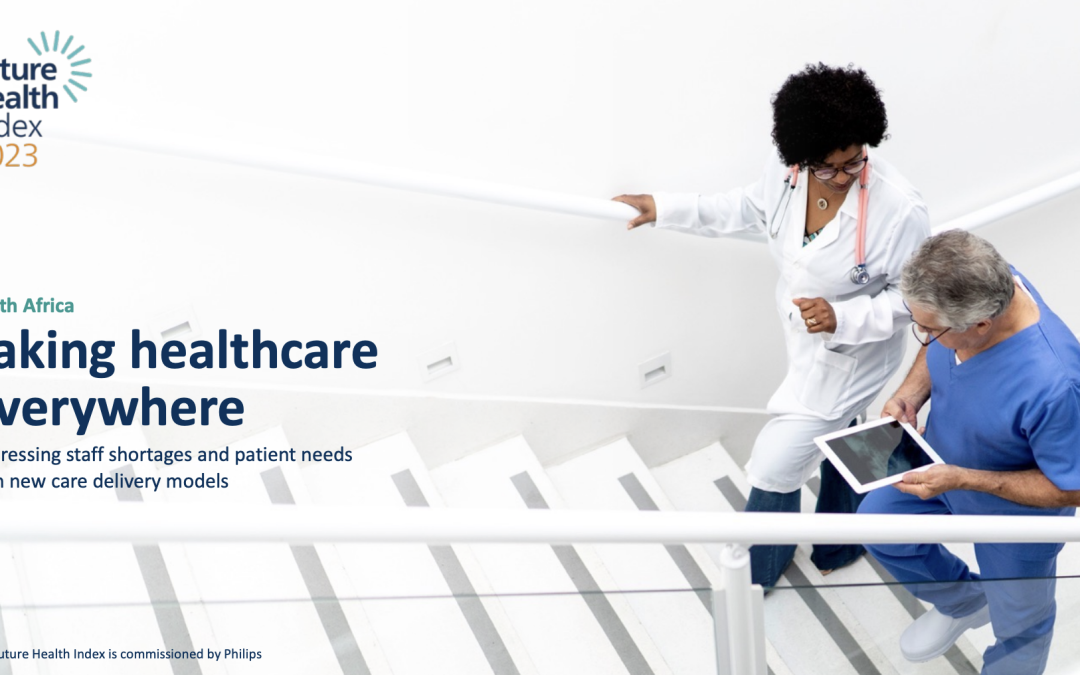Royal Philips, a global leader in health technology, today announced the results of the South African edition of its Future Health Index (FHI) 2023 report: Taking healthcare everywhere. The report indicates that healthcare leaders and younger healthcare professionals share a common vision for a more distributed healthcare system, powered by a dual-focus on creating a new future-fit paradigm of care delivery, while strengthening its current foundation.
Offering insight into the future of healthcare in South Africa, the eighth annual FHI 2023 report indicates that healthcare leaders and younger healthcare professionals believe new care delivery models will increase the affordability of health for patients while offering better outcomes and greater patient choice.
Speaking at the launch of the report today, Philips Southern Africa’s Managing Director, Romulen Pillay said “We’re creating healthcare ecosystems to realise affordable, effective care and greater patient choice for tomorrow.”
With South Africa’s public health system under strain, South African healthcare leaders and younger healthcare professionals see several challenges impeding progress to an effective healthcare ecosystem. Both healthcare leaders (23%) and younger healthcare professionals (20%) were most likely to select infrastructure issues as the number one technology challenge that needs to be solved to make the healthcare ecosystem work successfully. This is in stark contrast to their global counterparts, who rate infrastructure issues as the least prominent challenge.
But South Africans are not letting current realities hinder their vision for the future.
“We know that the best possible outcomes for patients are centred on receiving the right care at the right time, in the right place. That means, we can no longer focus on realising quality care in formal hospital settings, within specific siloed departments, or through dated technology. This legacy approach to health does not deliver the level of care we need,” said Pillay.
Bringing healthcare closer to the patient
Virtual care is becoming a mainstay of healthcare in South Africa, especially as it relates to telehealth or telemedicine – meeting patients where they are.
Given the interest in embedding virtual care in South Africa, it’s not surprising it ranks as a top area of focus for investment. Almost half of healthcare leaders (43%) say they are currently investing in remote patient monitoring solutions (higher than the global average of 28%), with a similar number investing in healthcare professional-to-patient virtual care (42%).
Younger healthcare professionals also want to see investment in virtual care. Half (50%) say they want their facility to currently invest in remote patient monitoring, making this their most selected investment area. Slightly fewer (47%) would like investment in healthcare professional-to-healthcare professional virtual care, which enables more distributed access to expertise across locations.
Closing the technology gap to meet workforce needs and expectations
South Africa’s healthcare system faces chronic staff challenges, due to hiring freezes and medical professionals leaving for employment opportunities overseas. To help reduce the impact of workforce shortages, some South African healthcare leaders are tapping into digital health technology. Forty-four percent say that their hospital or healthcare facility is using, or plans to use, digital health technology solutions to help reduce the impact of workforce shortages. This is similar to the response in Australia (49%) but is less than the global average (56%) and far less than the response in India (82%).
The report reveals that younger healthcare professionals, aware of the benefits of digital technology, see it as essential in the workplace. In fact, when it comes to choosing a hospital or healthcare facility to work technology is a top consideration. Younger healthcare professionals (59%) cite being at the forefront of AI in healthcare as an important factor, while more than half (54%) say the availability of technology for everyday tasks is an important factor.
It is encouraging that healthcare leaders are also placing priority focus on new technologies; a vast majority of healthcare leaders in South Africa (95%) would like their healthcare facility to heavily invest in AI technologies in the next three years – higher than their global peers (83%).
Partnering across the healthcare ecosystem
Even more so than in previous FHI reports, and at a higher rate than the global average, partnerships emerged as a key theme this year. Both healthcare leaders and younger healthcare professionals say that closer collaboration between providers is needed to deliver integrated, and sustainable, patient care across settings.
Around one-third (36%) of South African healthcare leaders are currently partnering with health technology companies. A similar number (30%) say the same for IT or data providers. These partners are expected to remain steady or grow in importance, with almost half of younger healthcare professionals (44%) saying their hospital or healthcare facility should partner with a health technology company three years from now, significantly higher than the global average of 23%.
“This shift in collaboration priorities highlights the considered focus on increasing access to care by advancing new care delivery models in South Africa,” said Pillay. “If technology solutions are combined with purposeful partnerships, deep clinical knowledge, and continued investments in transforming healthcare, I believe we will see the changes we need as a nation – serving everyone, everywhere.”
The FHI 2023 report is based on proprietary research among nearly 3,000 healthcare leaders and younger healthcare professionals conducted in 14 countries. To access the full report, visit https://bit.ly/FHISA23.


